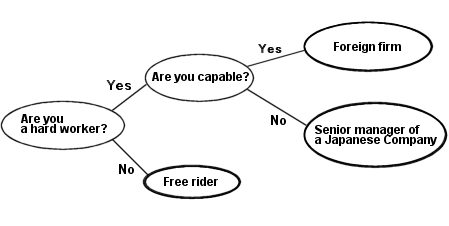July 17, 2002
Gresham's Law: Bad money drives out good money (or survival of the unfit) Darwin's Law: Survival of the fittest (or good money drives out bad money)
In a world where Gresham's Law applies, the exceptional cannot make full use of his capabilities since he is only given the same rewards as the mediocre. In contrast, where Darwin's Law rules, rewards are in line with ability; and competition drives progress. Throughout history, a nation under Darwin's Law prospers; but when Gresham's Law reigns, the nation declines.
Egalitarianism and the suppression of competition have formed the philosophical basis of Japan's postwar economic system. While this system functioned well during Japan's catch-up with the developed nations, the maturation of the Japanese economy and its integration with the global economy revealed its weaknesses. Despite these revelations, politicians, bureaucrats, and business leaders have fought to protect vested interests, providing fertile ground for Gresham's Law to flourish.
One example is the personnel system of Japanese companies, which is based on lifetime employment and seniority. Although attempts have been made to introduce tailored-made employment contracts for professionals based on performance, they have met strong resistance, and little progress has been made. Meanwhile, Japanese companies are losing their brightest talents (usually after providing them with training) to their foreign competitors, which offer more flexible remuneration packages (figure).
This is particularly true for the financial sector where foreign institutions have expanded their share of the Tokyo market. For those with neither motivation nor ability, however, it is in their best interest to remain in the socialist paradise of Japanese companies and ride free at the system's expense. With this hollowing out of talent in Japanese companies becoming an ever more serious problem, the sustainability of the traditional system is now at risk.
In an environment dominated by Gresham's Law, price deviates from value. For example, a person's wage won't reflect the value of his performance. For the Japanese economy to be freed from that curse, business leaders must not only be competent at judging the value of labor and capital, but they must also be able to quote prices accordingly. It is only through closing the gap between value and price that Gresham's Law is likely to give way to Darwin's Law.
Other examples where prices deviate from values abound. First, during the bubble period, ignorant investors purchased paintings (including fakes), property, and anything they could lay their hands on at exorbitant prices and subsequently suffered huge losses. Second, financial institutions rely solely on land and shares as collateral while extending loans without developing their own credit-rating systems based on the earning potentials of borrowers. As a result, venture businesses with no such collateral to offer have difficulty raising funds.
Finally, most Japanese consumers wrongly believe "the pricier things are the better," and this translates into a propensity for branded goods. They are responsive to the quality of goods and services, yet insensitive to their prices. No wonder Japanese tourists are charged higher prices worldwide.
The invisible hand of the market is the most effective way through which value and price can be matched. For example, by comparing the actual profit level with the market norm, one can obtain information pertaining to the performance of individual companies, as well as the abilities and efforts of managers. Yet, Japan's market economy is plagued with myriad distortions: barriers to entry, opaque administrative guidance, collusion, and so on. It is not a coincidence that many business scandals occur in heavily regulated industries, such as construction and finance, rather than in manufacturing, a sector that is exposed to competition.
Recently, the supervisory function of the main banks has greatly weakened. There is an urgent need to rebuild corporate governance based on market principles. As part of that process, it is necessary to replace the current system of promoting senior managers from within an organization to recruiting talent from outside. Also, objective market indicators should used to evaluate the performance of senior managers, and one way to achieve that is to link their rewards to company share prices by giving them stock options.
Despite the lip service given to the importance of competition, the equalitarian way of thinking remains deep-rooted. For instance, there are concerns that the introduction of stock options will cause income inequalities. Japan's income distribution is probably the most equitable among all nations in the world, and a widening of the income gap would do the country more good than bad. There must be a change of mindset from equality of outcome to equality of opportunity, so that hard work is rewarded.
Author, C.H. Kwan
Senior Fellow
Research Institute of Economy, Trade and Industry (RIETI)
Editor-in-Chief, Ichiro Araki
Director of Research
Research Institute of Economy, Trade and Industry (RIETI)
e-mail: araki-ichiro@rieti.go.jp
tel: 03-3501-8248 fax: 03-3501-8416
RIETI invites you to visit its English website
[http://www.rieti.go.jp/en/index.html].
The opinions expressed or implied in this paper are solely those of the author, and do not necessarily represent the views of the Ministry of Economy, Trade and Industry (METI), or of the Research Institute of Economy, Trade and Industry (RIETI).

